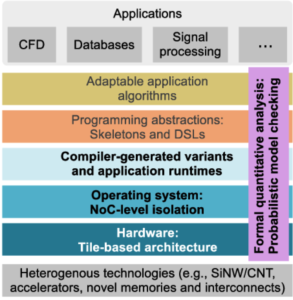
Example Software-Hardware Stack for Heterogeneous Systems (from www.semanticscholar.org)
The following blog was written by Computing Community Consortium (CCC) Chair Mark D. Hill from the University of Wisconsin Madison.
Due to technology challenges and potential societal benefits, NSF has provided sustained funding for issues surrounding effective scaling of parallel and distributed computing, including through the Exploiting Parallelism and Scalability (XPS) Program, begun in 2012, and the Scalable Parallelism in the Extreme (SPX) Program, started in 2016.
To illuminate directions in this area, NSF commissioned a workshop held in June 2019 as part of the Federated Computing Research Conference and led by Michael Carbin of MIT and Scott D. Stoller of Stony Brook University.
The workshop report was recently issued. Quoting the report, the crux of the challenge is:
… the highest-performance future computing systems will need to be specialized—customized in the hardware itself and the algorithms and abstractions underlying the software—to fit the exact organization and requirements of the application at hand. Systems incorporating a variety of specialized components form heterogeneous platforms that are potentially very powerful but also potentially make application development more difficult.
…
These challenges have put parallel and distributed computing at a crossroads: new abstractions are needed to manage the complexity of developing systems at the scale and heterogeneity demanded by new computing opportunities. This applies at all levels of the computing stack, encompassing the many disciplines (subfields of CS) that contribute to each level: the application itself (traditionally High-Performance Computing (HPC) but increasingly a variety of other application domains as well), its algorithmic design and implementation (Theory and Algorithms), the programming languages and implementations of the application and the underlying computing platform (Programming Languages, and Systems), and the underlying hardware platform (Computer Architecture).
The report goes on to give recommendations and identify research directions, as well as risks.
This report advances earlier reports from both the Computing Community Consortium (CCC):
- Arch2030: A Vision of Computer Architecture Research over the Next 15 Years from 2016 and
- 21st Century Computer Architecture in 2012 (cited in XPS 2012)
and DARPA Information Science and Technology (ISAT):
- I-USHER: Interfaces to unlock the specialized hardware revolution in 2019 (cf., recent CCC post) and
- Advancing Computer Systems without Technology Progress in 2012
as well as complements efforts by IEEE Rebooting Computing.









